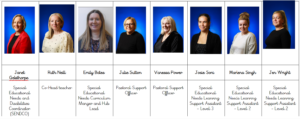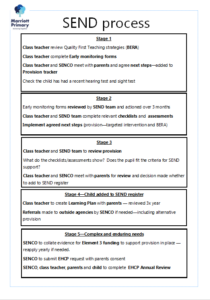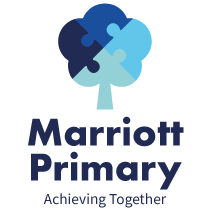Special Education Needs and Disabilities
What do we mean by Special Educational Needs and Disability (SEND)?
Children and young people who have special educational needs (SEN) do not necessarily have a disability and some disabled children and young people do not have special educational needs. There is, however, a significant overlap in the two groups.
What we mean by SEND?
The term special educational needs (SEN) has a legal definition which is set out in the Education Act 1996. It applies to children who have learning difficulties or disabilities that make it significantly harder for them to learn or access education than most other children of their age.
The term SEN covers a wide range of types of need including:
- specific learning difficulties;
- moderate learning difficulties;
- speech, language and communication needs;
- behavioural, emotional and social difficulties;
- autistic spectrum conditions;
- visual and hearing impairment;
- physical disability,
- multi-sensory impairment
- profound and multiple learning difficulties.
Meet the HUB SEND Team

These are the stages of the SEND progress that we follow at Marriott Primary School

SEND Policy, Plans and Reports
SENDIASS Leicester
At SENDIASS Leicester they can provide information and advice for:
· Parents and carers of children and young people aged 0 – 25 in Leicester City who are concerned about their child/young persons educational progress
· Children and young people aged 0 – 25 in Leicester City with SEND who are concerned about the educational progress they are making or the support they are receiving
Documents to support parents with the EHC process but there is further information on the SENDIASS website.
Useful SEND Websites
The following organisations can provide further information and support:
Please note that we are not responsible for the content of external websites.
Advisory Centre for Education advice and information on education issues.
AFASIC Supports parents and represents children and young people with speech, language and communication needs (SLCN).
Barnardo’s Children’s charity.
British Deaf Association (BDA)
BullyingUK part of family lives
Cerebral Palsy information from the Birth Injury Center
Children’s Legal Centre Free legal information, advice and representation for children, young people, their families, carers and professionals.
Centre for Studies on Inclusive Education (CSIE)
Child Law Advice website has a section for children and young people
Contact a charity for families of disabled children.
English Federation of Disability Sport
Family Fund Charity aiming to support, advise and possibly help with funds for families with severely disabled children.
Family Lives Family Lives aims to transform the lives of families by supporting parents at building happier relationships, happier families and a stronger society.
Huntington’s Disease Association
Headway National Head Injuries Association
I CAN – The children’s communication charity supports children with speech, language and communication difficulties.
Information, Advice and Support Services Network
IPSEA Independent Parental Special Education Advice
LOOK National Federation of Families with Visually Impaired Children)
KIDS (Working with disabled children, young people and their families)
MENCAP Support people with a learning disability.
Motability Exchange your mobility allowance to lease a car, scooter or powered wheelchair.
MIND (National Association for Mental Health)
National Association of Citizens Advice Bureaux
National Association of Special Educational Needs
National Deaf Children’s Society (NDCS) Families can also contact NDCS through their Freephone helpline on 0808 800 8880, helpline@ndcs.org.uk or NDCS live chat. Deaf children and young people can access information, share their experiences and have fun at www.buzz.org.uk.
National Federation of the Blind
Network 81 A national network of parents working towards properly resourced inclusive education for children with special needs.
Newlife A free national Helpline which supports and informs families of children with disabilities and terminal illness as well as grants for essential medical equipment.
Physically Disabled and Able Bodied (PHAB)
Rainbow Trust supports families who have a child aged 0-18 years with a life threatening or terminal illness and are in the greatest need.
Scope provide support and information if your child has a physical impairment, learning disability or any other condition.
Special Needs Jungle Parent-led information, resources and informed opinion about children and young people with SEN, special needs, disability, health conditions and rare diseases.
Sibs exists to support people who grow up with or have grown up with a disabled brother or sister.
The National Network of Parent Carer Forums
Whizz Kidz can help to transform the lives of disabled children across the UK, supporting them to become confident and independent young adults
Young Minds improving children’s wellbeing and mental health.
Social, Emotional and Mental Health Difficulties
These needs may reflect a wide range of underlying difficulties or disorders. Pupils may have: · Mental health difficulties such as anxiety, depression or an eating disorder · Attention deficit disorder, attention deficit hyperactive disorder or attachment disorder · Suffered adverse childhood experiences These needs can manifest in many ways, for example as challenging, disruptive or disturbing behaviour, or by the pupil becoming withdrawn or isolated.
Cognition and Learning
Pupils with learning difficulties usually learn at a slower pace than their peers. A wide range of needs are grouped in this area, including: · Specific learning difficulties, which impact 1 or more specific aspects of learning, such as: dyslexia, dyscalculia and dyspraxia · Moderate learning difficulties · Severe learning difficulties · Profound and multiple learning difficulties, which is where pupils are likely to have severe and complex learning difficulties as well as a physical disability or sensory impairment
Communication and Interaction
Pupils with needs in this area have difficulty communicating with others. They may have difficulty understanding what is being said to them, have trouble expressing themselves, or do not understand or use the social rules of communication. Pupils who are on the autism spectrum often have needs that fall in this category.
Sensory and/or Physical
Pupils with these needs have a disability that hinders them from accessing the educational facilities generally provided. Pupils may have: · A sensory impairment such as vision impairment, hearing impairment or multi-sensory impairment · A physical impairment These pupils may need ongoing additional support and equipment to access all the opportunities available to their peers.
Local offer - Leicester
Families Leicester local offer
The local offer is the central point of information covering education, health and care services for young people.
Interventions

